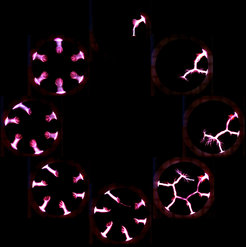Invention for the treatment of chronic wounds receives research prize

Copyright: MPE
"Ignition" of a cold plasma.
Copyright: MPE
The treatment of chronic wounds and skin diseases plays an important role in medicinal practice. In particular, more and more drug resistant bacteria and hospital infections pose an increasing challenge. One possible solution to this problem has been found by a team led by Prof. Gregor E. Morfill, Director at the Max Planck Institute for Extraterrestrial Physics. The scientists developed various plasma devices and prototypes, which can kill bacteria, fungi and even viruses. The devices produce a so-called cold, atmospheric plasma, a highly diluted mixture of charged molecules and atoms ("ions"), free radicals and ultraviolet light. When holding the plasma device over an open wound, the plasma flows over it like a cool breeze, killing the bacteria in and around the lesion without contact and pain. Even drug resistant bacteria and hospital infections can be treated in this fashion.
A clinical study has already shown the efficiency of this new treatment method. At the clinic for dermatology, allergology and environmental medicine at the Klinikum Schwabing, Städtisches Klinikum München GmbH, 36 patients with chronically infected wounds were treated 291 times under the supervision of Dr. Georg Isbary and Prof. Wilhelm Stolz. In addition to the standard treatment, including antibiotics and other substances, the patients also received a five-minute plasma therapy. The results of this study, already published in the renowned British Journal of Dermatology, demonstrate that these patients had 34% less germs - independent of type of germ and resistance pattern - than the control group, who received only the standard treatment. There were no side effects such as pain. These very positive first results show an entirely new way for treating superficial, chronically infected wounds.
Another very promising application area for the new plasma devices, available in the form of small handheld prototypes as well, is the disinfection of temperature sensitive surfaces, such as human skin. Physicians and hospital staff could disinfect their hands in just a few seconds without using lotions, ointments or sprays, which can lead to skin problems in the long run. The handy applicators could even be used domestically for disinfecting small cuts or prophylactically treating periodontitis.
The "Fondation URGO", who aims to improve the diagnosis and therapy of chronic wounds, awarded the URGO research prize at a ceremony in Bremen. This prize recognises innovative projects based on an interdisciplinary, medical concept with a focus on transferring scientific results into medical practice. Involved since the patent was filed, Max Planck Innovation, the technology transfer organisation of the Max Planck Society, now supports the successful commercial implementation of this innovation.
